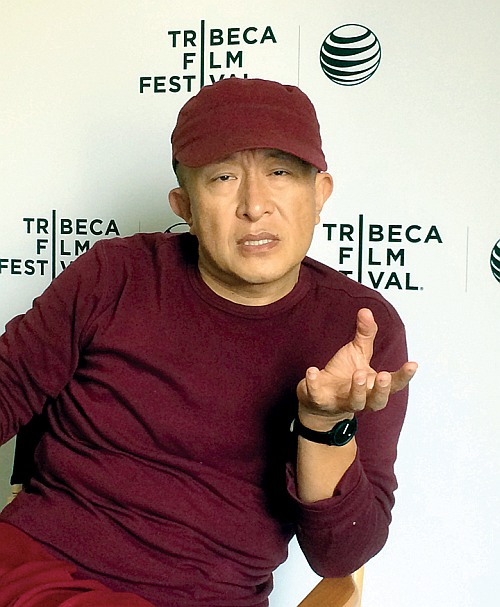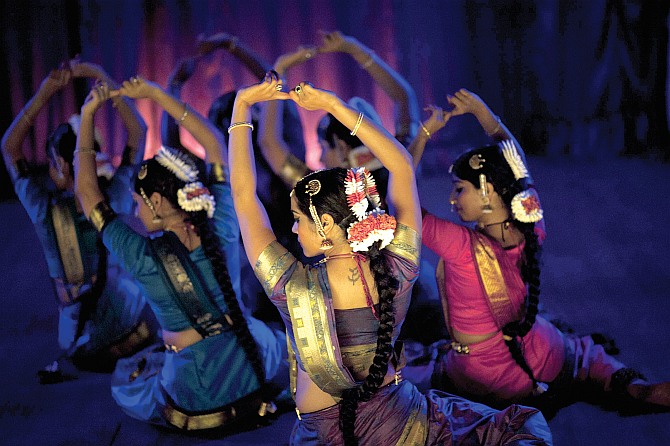Photographs: Aseem Chhabra Aseem Chhabra/Rediff.com in New York
In between meditating in the Himalayas and attending prayer sessions, Khyentse Norbu finds time to make films that satisfy his creativity.
Aseem Chhabra/Rediff.com finds what brings this recluse into the spotlight.
Filmmaker and writer Khyentse Norbu (Dzongsar Jamyang Kheyntse Rinpoche) is a Buddhist lama, who has three films to his credit -- The Cup (1999), Travelers and Magicians (2003) and Vara: A Blessing (2013).
The Cup is the story of young Tibetans based in Dharamsala, who want to watch the soccer World Cup on television. It played in the Director's Fortnight section at the Cannes Film Festival and was later Bhutan's official entry for the foreign language Oscar race.
Norbu, who spends a substantial time at a monastery in North India, was in New York for Vara's North American premiere at the recent Tribeca Film Festival.
The film revolves around a young village woman, a dancer, in an unnamed location in India, who must balance tradition and old ways with her desires to liberate herself. The film explores caste, class and religious divides that define rural life in contemporary India where BlackBerries and untouchability live side-by-side.
You are an ordained Buddhist lama and a filmmaker. How do you balance those two lives?
Not so well. For instance, Vara's world premiere was at the Busan International Film Festival. They invited me to open my film, but unfortunately I was 4,500 metres high in a cave in Bhutan, in the Himalayas.
Why?
I was meditating and it was a five-day walk to the nearest town.
But you knew about the premiere?
I knew it, but I opted for meditation, because that is my profession.
Don't you see yourself as a filmmaker?
I never see myself as a dedicated filmmaker. It's just not possible. The only reason I am doing this -- well there could be other reasons, including a sense of satisfaction -- but I want to make a film on the life of the Buddha. That';s a big project and it will cost a lot. I don't know if it will happen, but if it does, I need to prepare myself. I need to know how to do it.
So let's talk about Vara. You shot it in Sri Lanka. I am curious why didn't you shoot in India?
I was told the bureaucracy would be an issue in India.
But you shot The Cup in India?
Yes, but that was in my monastery. I didn't require any permission. But this one was a big project with a crew and actors.
Why were you attracted to this story? It is quite different from your first two films.
There was the urge to take on a bigger challenge and learn to work with real actors and real crew. Besides that I have always admired Indian classical dance and I always thought somebody should present it to the larger world. I have to say even with Vara I couldn't do it.
Originally, I wanted to make a film about dance, its nuances and discipline. And I was lucky I got Shahana Goswami to perform with her dance training.
Why did you decide to make the film in English?
We had a lot of discussions about it and it was decided we make it in English for the larger audience.
Then you had the film subtitled as well?
We realised that many times people found the accents difficult.
So it was a business decision then?
I am totally not involved in the business side of the film. Artistically, probably it would have been better if it were in Hindi or Tamil.
I loved the look of the film -- the production design and the cinematography.
I have a very good production designer -- Aradhana Seth. But I have to single out my editor and my sound engineers for their excellent work. They got the mood and the pace in a nice way.
...
'I wrote to Shah Rukh Khan, asking him to support art'
Image: A scene from Vara: A Blessing.Photographs: Pawo Choyning Dorji Aseem Chhabra/Rediff.com
What are your expectations from this film, especially in India?
It played at the Goa and Kerala film festivals and I was very surprised by the reception. Of course, it is not a mainstream film.
What about Bhutan? I know television has come to Bhutan. Are there any movie theatres?
Yes, there are two theatres and surprisingly they show Bhutanese films. Bhutan in a very strange and nice way is making lots of films. You have to book the cinemas way before.
So they are not showing Indian films?
They used to show Indian films, but not anymore. Of course, there is television and they show a lot of Indian programmes. In any case, a lot of Bhutanese films are like Bollywood movies.
I read that you worked on Bernardo Bertolucci's Little Buddha.
Well, if you call it that. I sat next to Bernardo and if he asked me questions about Buddhism, I gave him the answers. I was a Buddhism consultant. I didn't know about film at that time.
Did you have any formal training in filmmaking?
I had enrolled in a school in London, just before Bertolucci decided to make Little Buddha. But after two weeks the principal suggested I should go work with Bertolucci. He told me that was the best school.
Do you have a script on the Buddha project?
I have a script in my head and it's basically on the Buddha's life. But it is always going to be difficult because many Buddhists will have different points of views on who was Buddha.
So, that is going to be your next project?
No, it's too early. I have two stories, both set in Bhutan and they will be much smaller. Again, they will be obscure.
Your films are not obscure. The Cup was such a sweet delightful film. I took my son, when he was 9, to see it.
I don't know. Sometimes I feel I am not speaking to the larger audience.
Well, you are not making a Bollywood film with Shah Rukh Khan.
I wrote to him saying that he had achieved everything, reached the peak, and now he didn't need to struggle. Here was a chance to support art. Come and join us even in a small role. But there was no response.
Did you send him an e-mail or a letter?
I sent both, but I am sure they were never opened.



Comment
article